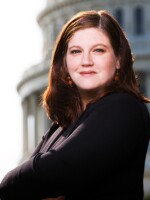When members of Congress return from their holiday break, lawmakers will be delving into the intelligence and security lapses that allowed a would-be bomber, laden with explosives, to board an airplane bound for the United States.
But some people are pointing their fingers right back at Congress. Did lawmakers do everything in their power to prevent the Christmas Day bomb attempt and future attacks?
"I'm, in a weird way, sort of glad we had this moment one more time to examine this issue," says Bob Kerrey, a former senator and member of the 9/11 Commission. The commission took a bipartisan look at what went wrong before the Sept. 11 attacks and issued detailed recommendations.
"In 2004 when we made our recommendations, Congress very quickly, with an overwhelming affirmative vote, reformed the executive branch. And I don't think [it] mustered 15 votes to reform itself," he says.
One of the commission's most urgent recommendations was for Congress to reorganize its oversight of intelligence and security agencies. Today, six years after the commission's report, Congress has mostly ignored that recommendation.
The commission also urged the Transportation Security Administration and Congress to give priority attention to improving the ability of screening checkpoints to detect explosives on passengers.
"We didn't do it," says Kerrey.
The results: undetected explosives; no chief of the TSA because of a political fight in the Senate; and a convoluted oversight process in Congress that few can unravel.
Former Rep. Lee Hamilton was vice chairman of the 9/11 Commission. He says Congress has not centralized oversight of homeland security, as called for by the commission.
"The jurisdiction is split among dozens, really, of committees and subcommittees," says Hamilton.
Hamilton now heads the Woodrow Wilson Center for Scholars, a Washington think tank. He says in 2008, officials from the Department of Homeland Security attended more than 370 congressional hearings. They gave more than 5,000 briefings to members of Congress.
"That really is an absurdity," he says. "When you have that many people involved in the oversight process in the Congress, it greatly dilutes it. Nobody has the clout and strength to push through improvements. It's just too diffuse and too decentralized."
There was one big change that followed the recommendations. When Democrats took control of Congress in 2006 and Nancy Pelosi became House speaker, she set up a brand-new committee called the Select Intelligence Oversight Panel. She put New Jersey Democrat Rush Holt in charge of it.
The panel is an unusual creature, Holt says, because it combines powers that are usually kept separate in Congress: overseeing an agency and funding it. He says the 9/11 Commission specifically recommended giving Congress more control over the somewhat autonomous intelligence agencies.
"They felt they would give the committee enough clout that the intelligence heads couldn't... well, couldn't blow them off," says Holt.
Holt says in the three years the new panel has operated, it has improved oversight of domestic surveillance, covert operations and other areas — so it has been partially successful.
"The oversight is stronger," says Holt. "Sure, there was occasional oversight before, but not as strong as it is now. Now, is it good enough? Of course not. Obviously things aren't working right or we wouldn't have had the Christmas bombing that only the diligence and bravery of the people onboard stopped."
No comparable oversight mechanism has been established in the Senate.
Moreover, there are those who argue against implementing the 9/11 Commission recommendations. Heather Wilson, a former Republican representative from New Mexico, has focused on national security for much of her career.
"The idea that centralizing oversight improves oversight, I think, is not necessarily true," she says. Lots of lawmakers have ideas about how intelligence agencies should be run, she says, and they don't all have the expertise to back up their opinions. Wilson says she believes there's a reason intelligence professionals are just that — professionals.
But Wilson does think there's a problem with oversight whenever you have an executive branch and a legislative branch controlled by the same party. She saw that in the Bush years, and she's seeing it now.
"Can you imagine what these hearings coming up in January would be like if this was a Republican president, and the secretary of homeland security had said the system worked?" says Wilson. "I mean this would be a firestorm on Capitol Hill. And it is so much more muted."
While lawmakers prepare for hearings next week, Wilson and others hope they can set aside politics as much as possible and figure out how to correct the systems that failed on Christmas Day.
The 9/11 commissioners say Congress should be delving into its own mistakes, too — although Kerrey doesn't have much hope for that.
"What you're going to get is an exercise in flagellation; you know, looking for someone to blame, looking for someone to hang out," Kerrey predicts, "and Congress one more time dodging the bullet of having to reform itself."
Copyright 2022 NPR. To see more, visit https://www.npr.org. 9(MDAzMjM2NDYzMDEyMzc1Njk5NjAxNzY3OQ001))






